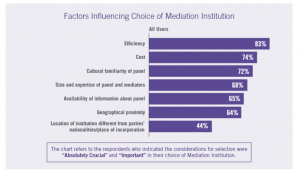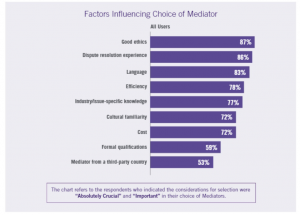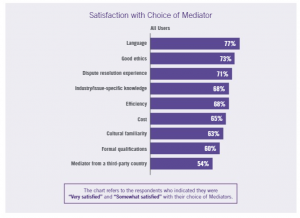This is part 2 of a 3 part blog series highlighting select findsings from the SIDRA Survey 2020. To read Part 1, click here. The SIDRA Survey delves into the user experiences of Legal Users (lawyers and legal advisers) and Client Users (corporate executives and in-house counsel) in international commercial dispute resolution. Through an examination of user experiences of major dispute resolution mechanisms (i.e., arbitration, litigation, mediation and hybrid mechanisms), unique insight into user perspectives of each mechanism can be observed (executive summary of the SIDRA Survey can be accessed here).
In this post, we will explore the key factors that influence users’ choice of mediation institution and choice of mediator. The top three factors influencing users’ choice of mediation institution were identified as (1) efficiency; (2) cost; and (3) cultural familiarity of mediator panel. The top three factors influencing users’ choice of mediator were (1) good ethics; (2) dispute resolution experience; and (3) language. Read together with the data on user satisfaction, the findings suggest that overall, users are satisfied with their choice of mediation institution and mediator.
Choice of Mediation Institution and Respondent User Satisfaction

Source: 2020 SIDRA Survey, Exhibit 7.2.4
The most commonly used institutions among survey respondents were SIMC (65%) and ICC (45%), followed by CEDR (22%) and HKMC (18%) (see 2020 SIDRA Survey, Exhibit 7.2.6). Here it is important to note that in this first year of the SIDRA Survey, the majority of respondents were from Asian jurisdictions, especially Singapore.
In terms of factors influencing choice of institution (see 2020 SIDRA Survey, Exhibit 7.2.4), efficiency (83%) was the main consideration, followed by cost (74%), cultural familiarity (72%) and size and expertise of panel and mediators (68%). Notably, 72% of respondents ranked cultural familiarity of panel as ‘absolutely crucial’ or ‘important’ in selection of mediation institution. In cross-border mediation, it is essential for a mediation institution to have a panel of mediators familiar with diverse cultural backgrounds. As the success of mediation is heavily dependent on human interaction and negotiation skills, familiarity with different cultures in mediation can play a significant role.
69% of users were ‘very satisfied’ or ‘somewhat satisfied’ with efficiency of mediation institution, followed closely by cost (68%), size and expertise of panel and mediators (65%), and cultural familiarity of panel (64%) (see 2020 SIDRA Survey, Exhibit 7.2.5). As factors ranked absolutely crucial or important were also rated satisfactorily by a majority of users (more than 60%), this suggests overall satisfaction of users with their choice of mediation institutions.
Choice of Mediator and Respondent User Satisfaction

Source: 2020 SIDRA Survey, Exhibit 7.3.1
A majority (87%) of respondents ranked good ethics as an ‘absolutely crucial’ or ‘important’ in their choice of mediator, followed closely by dispute resolution experience (86%) and language (83%). More than 70% of respondents ranked efficiency (78%), industry/issue-specific knowledge (77%), cultural familiarity (72%) and cost (72%) as ‘absolutely crucial’ or ‘important’. The factors that users take into account in selection of mediators appear broadly similar to the factors in their selection of arbitrators (see 2020 SIDRA Survey: Exhibit 6.3.1). These findings reflect the importance users place on professionalism and accountability in confidential dispute resolution processes in which procedural flexibility gives mediators considerable power. New regulatory developments in international mediation, such as Articles 5(1)(e) and (f) of the Singapore Convention, place the spotlight on professional standards for mediation practice and in this regard are congruent with users’ priorities.

Source: SIDRA Survey, Exhibit 7.3.2
More than 70% of users were ‘very satisfied’ or ‘somewhat satisfied’ with language (77%), good ethics (73%), and dispute resolution experience (71%). Even with a slight discrepancy between these identified factors and their corresponding experience with them, the chart shows that users were largely satisfied with the aforementioned top three factors influencing their choice of mediator. Further, with respect to other factors, there were no large discrepancies between the proportion of users who placed high importance on a particular factor compared with the proportion who indicated satisfaction with it.
In Part 3, we take a look at the use of technology and mediation and the different attitudes of client and legal users on this topic.
________________________
To make sure you do not miss out on regular updates from the Kluwer Mediation Blog, please subscribe here.


